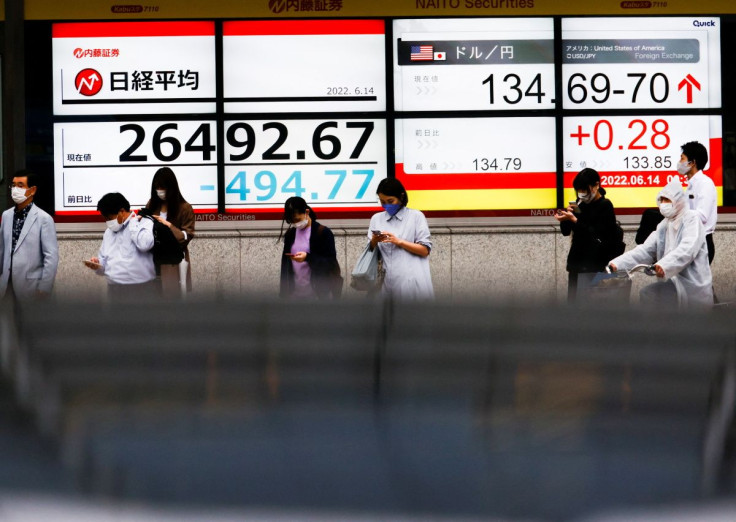Stock, Bonds Groggy After Rout, Eyes Peeled On Fed Meet

Global stocks and bonds stemmed heavy losses on Tuesday in choppy trade as investors tried to recover from the previous day's rout, while bracing themselves for an U.S. interest rate rise this week that could be the largest in 28 years.
Surprisingly strong U.S. inflation data released last Friday has fuelled bets that the Federal Reserve must tighten monetary policy more aggressively to tame soaring prices. Fears that the tightening could bring on a recession walloped global equities and government bonds on Monday.
Investors are now betting with near certainty that the Fed could announce a 75-basis-point rate increase - the largest since November 1994 - at the end of its policy meeting on Wednesday.
"It's the meeting everyone has on their radar..., and the market will be hanging off every word Fed Chair Jerome Powell has to say," said Chris Weston, head of research at Pepperstone Group Ltd, a currency broker in Australia. "The market wants answers on its commitment to smash inflation."
By late morning in New York, the Dow Jones Industrial Average had ceded early gains and was down 0.39%. The S&P 500 sagged 0.23%, and the Nasdaq Composite was flat.
MSCI's gauge of stocks around the world dropped 0.52% to levels last seen in November 2020, while a pan-European equity index slumped 1.05% to March 2020 lows.
Underscoring expectations of rising U.S. rates, two-year Treasury yields hit a high of 3.430%, the highest since November 2007. Ten-year Treasury yields hovered at 3.3848%, within sight of an 11-year high of 3.440% struck on Monday. [US/]
Markets now see the Fed's rate hike cycle peaking around 4%, rather than the 3% seen last month.
Euro zone government bond yields also hit new multi-year highs, as spreads between core and periphery widened amid concerns about accelerated central bank monetary tightening. [GVD/EUR]
Investors' repricing of higher rates has pummelled assets that benefited from rock-bottom interest rates - stocks, crypto, junk-rated bonds and emerging markets.
Monday's sell-off pushed the S&P 500 index into a so-called bear market, as it has lost more than 20% from its most recent closing high.
"Quite simply, when we see monetary tightening the order of what we are seeing globally, something is going to break," said Timothy Graf, head of EMEA macro strategy at State Street.
"Stock markets are reflecting the reality of the first-order effect of tighter financial conditions," Graf said, predicting that with U.S. stock valuations still above COVID-era lows, there was more pain to come.
"I think there are other shoes to drop," he added.
Asian shares too fell 1%, catching up with Monday's bleak Wall Street session.
Crypto markets, where bitcoin and ether hovered near 18-month lows, have also been drubbed by interest rate expectations and crypto lender Celsius Network's decision to freeze withdrawals.
Bitcoin, which fell as low as $20,816, recovered to $22,377.9 on Tuesday.
Brent crude futures rose above $123 a barrel, supported by the tight oil supply picture. [O/R]
State Street's Graf did not see recession as inevitable but acknowledged that "monetary tightening and the squeeze on real incomes from commodity prices mean the probability has gone up".
Markets are also having to contend with the dollar's surge to new 20-year peaks against a basket of currencies.
It was up 0.26% on Tuesday, pressuring the yen to languish near 24-year lows against the greenback. [USD/]
With the Bank of Japan expanding bond purchases on Tuesday and unlikely to budge from ultra-low rates policy at its Friday meeting, a respite for the yen looks unlikely.
"Given Wednesday may see the Fed go 75 bps and flag more, while the BOJ on Friday will only flag more bond-buying, the yen is not going to stay at these levels for long. It's going to get much, much worse," Rabobank strategist Michael Every said.
© Copyright Thomson Reuters 2024. All rights reserved.


















